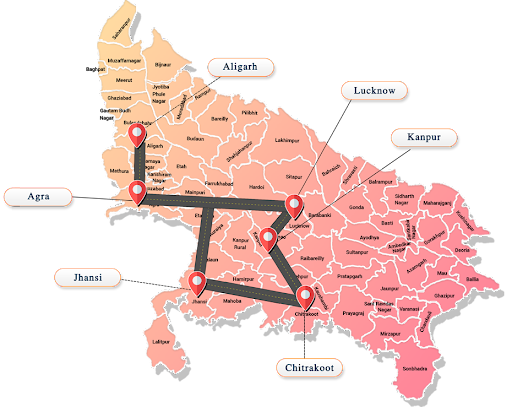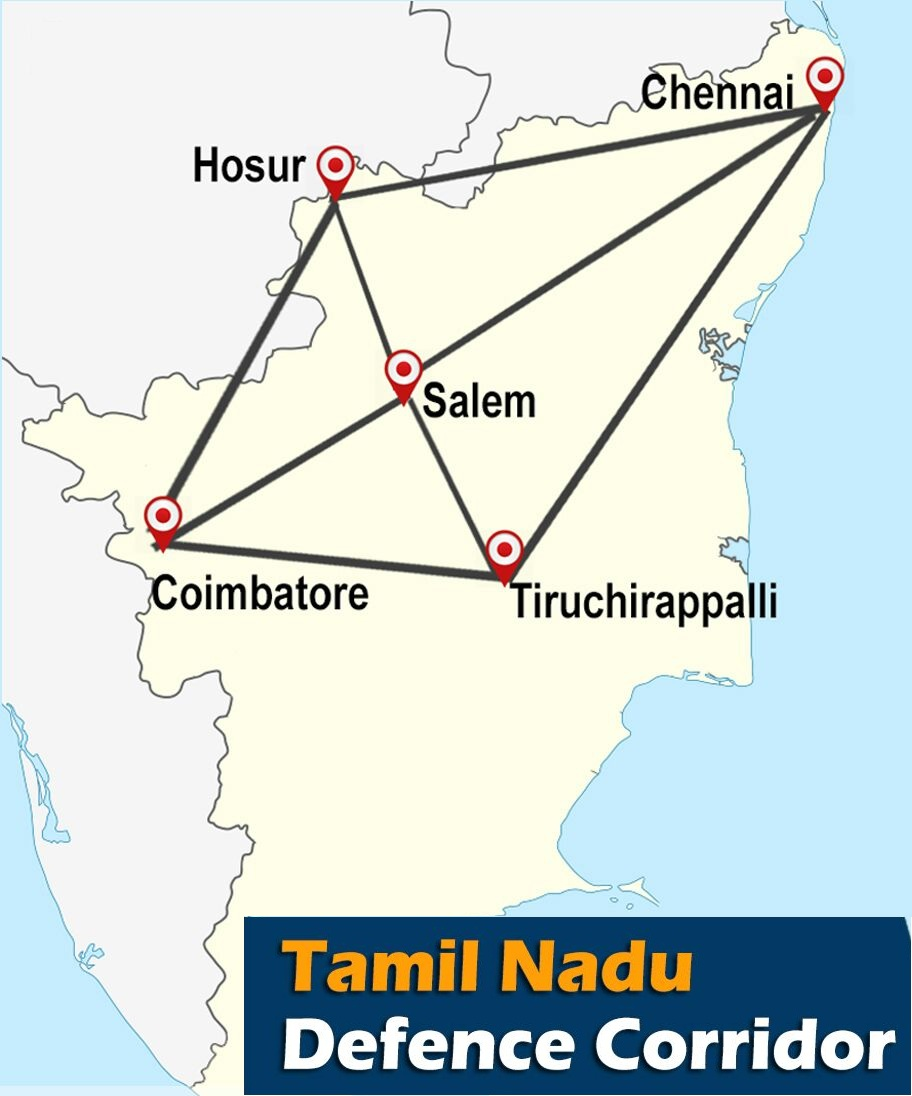Indian Economy
Defence Industrial Corridor
- 24 Sep 2021
- 6 min read
Why in News
Recently, the Prime Minister visited the exhibition models of the Aligarh node of the upcoming Uttar Pradesh Defence Industrial Corridor.
- It was announced by the Prime Minister while inaugurating the UP Investors Summit in Lucknow in 2018.
- The government has established another Defence Industrial Corridor in Tamil Nadu.
Key Points
- Defence Industrial Corridor of UP:
- It is an aspirational project that intends to reduce foreign dependency of the Indian Aerospace & Defence Sector.
- It will have 6 nodes – Aligarh, Agra, Kanpur, Chitrakoot, Jhansi and Lucknow.
- The Uttar Pradesh Expressways Industrial Development Authority (UPEIDA) is the nodal agency to execute this project in conjunction with various other state agencies.
- It aims to bring up the state as one of the largest & advanced Defence manufacturing hubs and put it on the world map.
- Features:
- Single Window approvals and clearances to Defence and Aerospace (D&A) manufacturing units via Nivesh Mitra.
- Nivesh Mitra Portal has been launched by the Government of Uttar Pradesh to ease the Ease of Doing Business in the state.
- Labour Permits for D&A industry towards flexible employment conditions.
- Simple Procedures and rationalised regulatory regime with easy reimbursement of incentives and subsidies.
- Assured water supply and uninterrupted electricity.
- Connectivity with 4-lane heavy-duty highway.
- Single Window approvals and clearances to Defence and Aerospace (D&A) manufacturing units via Nivesh Mitra.
- Reason for choosing UP for Defence Corridor:
- Uttar Pradesh is the fourth largest state in India and the third largest economy within the country.
- With a population of more than 200 million, UP has the highest number of available labour force and is one of the top five manufacturing states in India.
- The state also ranks first in terms of number of Micro, Small & Medium Enterprises (MSMEs) in the country and ranks 2nd in Ease of Doing Business (EoDB).
Defence Corridors
- About:
- A defence corridor refers to a route or a path along which domestic productions of defence equipment by public sector, private sector and MSMEs are lined up to enhance the operational capability of the defence forces.
- Significance:
- It will help in making the nation self-reliant in the field of defense production and promoting 'Make in India', which will reduce our imports and promote the export of these items to other countries.
- It will provide a fillip to the defence manufacturing ecosystem through synergistic development of technologies, promote the growth of private domestic manufacturers, including MSMEs and Start-Ups.
- Challenges:
- Technological Development in Defence:
- The first challenge in the development of technology is in advanced electronics and materials, which cut across all the verticals.
- The second challenge is relative immaturity of Material Science to use lighter and stronger intelligent material.
- Meeting Industries Expectations:
- Meeting expectations of the industry, who not only wants faster clearance of their proposals for setting up or shifting their bases, but also tax benefits like in Special Economic Zones (SEZ), faster decision making etc is a challenge for the government.
- Less Involvement of Private Players:
- While there is an over-concentration of orders with the public sector (leading to choking and queuing), hardly any orders are actually flowing to the private players.
- Human Resource:
- Unavailability of talented human resources is also one of the major issues.
- Technological Development in Defence:
Tamil Nadu Defence Industrial Corridor
- It comprises Chennai, Tiruchirappalli, Coimbatore, Salem and Hosur. It will create new defence production facilities and promote clusters with necessary testing and certification facilities, export facilitation centres, technology transfer facilitation, etc.
- The corridor was inaugurated in 2019.
Way Forward
- Its success would lie in addressing the concern of ‘Make in India’ in addressing the concern of industry, attracting investments, generating employment, creating contemporary technologies, aiding the growth of the manufacturing sector and making India Self-reliant.
- The right infrastructure, support for a vibrant supply chain network, skill development, involvement of established national and global players to bring in capital and viable projects can give the required traction.
- There is a need to identify short term, medium-term and long-term roadmaps keeping existing capability, requirements, technology, capital and infrastructure development in mind. It will also help in the development of clusters with supporting ecosystems around them.






